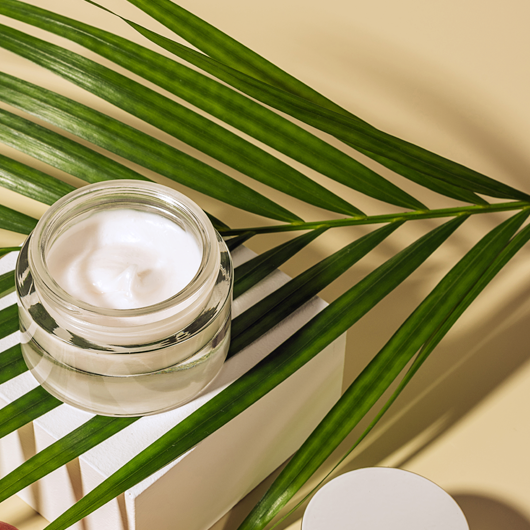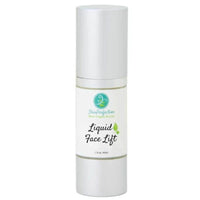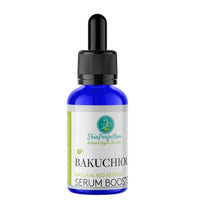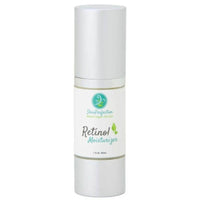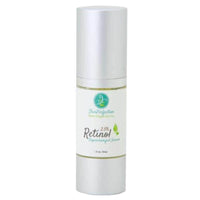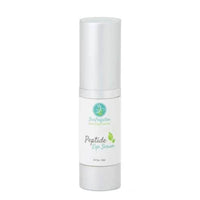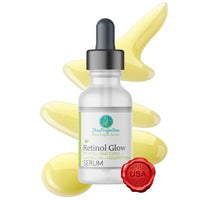Retinol
Retinol vs Retinal
 The fundamental structure of Retinal is Vitamin A. In its purest form, it is Vitamin A that you can apply directly to your face. Vitamins are necessary to consume for the health of our bodies. But why do we want to use it to our faces?
The fundamental structure of Retinal is Vitamin A. In its purest form, it is Vitamin A that you can apply directly to your face. Vitamins are necessary to consume for the health of our bodies. But why do we want to use it to our faces?
Retinal is one of the world's most popular anti-aging ingredients. Vitamin A contains ultra-rich nourishing nutrients that improve the appearance of the skin. In addition, these nutrients encourage cell turnover, which minimizes the appearance of fine lines and wrinkles that threaten to take over as we age.
Vitamin A is a necessary nutrient for our bodies, so it only makes sense that it is also essential for the skin. However, while the skin can utilize some of the Vitamin A consumed, applying retinal topically is far more beneficial.
So, take full advantage of all of the benefits Vitamin A offers. While it is available independently, retinal is often combined with other anti-aging ingredients to improve its effects.
Benefits of Retinal
It reduces the appearance of wrinkles. In addition, vitamin A encourages healthy skin development with increased cell turnover and helps remove superficial fine lines by sloughing off dead skin cells.
As we age, our skin becomes less able to produce new layers, meaning old, dead skin cells will remain on the face and settle into our lines and wrinkles.
Applying Retinal improves the skin's growth cycle. It is vital to help your complexion look younger, especially when you see signs of aging.
Retinal is an effective antioxidant. Free radicals enter the skin through the environment caused by sun exposure and pollutants. These free radicals attack the face. Antioxidants create a protective barrier between free radicals and skin cells.
This helps to protect the skin from premature aging. In addition, it allows it to be restored. Youthful complexions with the proper nutrients encourage healthy collagen, which further aids in minimizing lines and wrinkles.
Retinal also keeps your skin clear. Unfortunately, even though many women are lucky enough to leave acne in their teenage years, many of us still get spots, even as we mature.
Retinal unclogs pores by exfoliating dead skin cells, combating oiliness, reducing redness, and improving skin texture, which few other ingredients can do on their own.
Retinol, A form of Vitamin A
 Cosmetic Independent Review (CIR) suggests that Retinol is safe in small doses but should not be applied when pregnant or becoming pregnant.
Cosmetic Independent Review (CIR) suggests that Retinol is safe in small doses but should not be applied when pregnant or becoming pregnant.
Dermatologists have long recommended vitamin A as the best treatment for wrinkles.
Vitamin A helps the cells in our skin turnover and regenerate faster, exfoliating the dead outer layer of skin and leaving fresh new skin to appear.
It also minimizes pores, especially larger pores that can appear as we age or as the pore wall deteriorates.
Vitamin A Treatments for the Face
There are few nutrients as good for the skin as vitamin A. Not only is it a powerful antioxidant, but it also is an excellent anti-aging treatment. In addition, it is the number one ingredient most recommended by dermatologists to reduce the look of wrinkles.
However, remember that vitamin A deactivates by sunlight and air. The most effective products will come in clouded, airless pumps.
Vitamin A has three primary functions: reducing wrinkles, lightening dark spots and discolorations, and smoothing rough patches of skin. Remember that vitamin A is often packaged as a "retinoid."
As we age, our skin becomes less able to regenerate itself. In addition, photo-aging occurs when we are younger and begins to catch up with us. Vitamin A helps fight these signs of aging by boosting the skin's natural ability to renew and regenerate healthy cells.
It also contributes to alleviating wrinkles' appearance by pushing dead skin cells to the surface, where they can be naturally sloughed away.
This is especially important as layers of fresh, healthy skin can be covered by decaying skin, giving the entire face a gray, dull, sagging complexion.
Increase Blood Flow
By increasing blood flow to the application areas, vitamin A helps fade blemishes even in the deepest layers of skin. For example, under-eye discoloration can be caused by inadequate blood flow and eliminated by applying this ingredient to the area.
Better blood flow brightens the appearance of the entire face but can especially work to lighten age spots and other blemishes that occur at all ages.
Last but certainly not least, the function is to even areas of roughness in the skin. For example, a retinoid cream can soften acne scars, pockmarks, and other roughness.
Unfortunately, these rough patches cause the skin to look dull and have uneven coloring, making the entire face appear more aged than it is.
By increasing the amount of blood flow, the skin can return to its natural, more even appearance.
A straight vitamin A cream may irritate some women, especially those with sensitive skin. In addition, some women report drying and redness after applying a retinoid.
You can counteract this with a soothing moisturizer to eliminate redness and soothe irritation.
It is essential to apply the serum at night and only in the areas where it is most needed.
Benefits of Retinol
-
Anti-Aging Properties: One of the most lauded benefits of retinol is its ability to diminish the appearance of fine lines and wrinkles. It works by boosting the production of collagen, a protein that provides structure and elasticity to the skin, making the skin look firmer and more youthful.
-
Improved Skin Texture: Retinol can help promote faster cell turnover, which means that it aids in the shedding of dead skin cells and the regeneration of new ones. This results in a smoother, more even skin texture.
-
Pore Size Reduction: Retinol can minimize the appearance of enlarged pores, often caused by dirt, oils, and clogged dead skin cells. By increasing cell turnover and unclogging pores, retinol makes the pores appear smaller.
-
Acne Treatment: Retinol can also be beneficial for those with acne-prone skin. It unclogs pores, reducing the likelihood of breakouts. Plus, by regulating oil production and reducing inflammation, it addresses two of the primary factors that contribute to acne.
-
Enhanced Skin Tone: With consistent use, retinol can help fade dark spots, age spots, and sun-induced discoloration. It can improve the overall skin tone, making it look brighter and more radiant.
Note: While retinol offers numerous benefits, it's essential to approach its use cautiously. It can cause sensitivity to the sun, so always apply sunscreen when using retinol products. Additionally, it's a good idea to consult with a dermatologist before incorporating retinol into your skincare regimen, especially if you have sensitive skin or specific skin concerns.
Top 3 Retinol Alternatives: A Simple Guide for Radiant Skin
Ladies, let’s talk skin. As we embrace our golden years, our skin starts to show its age. Lines, wrinkles, and dark spots become more pronounced. But just because we’re getting wiser, it doesn’t mean our skin can’t stay radiant! Many women turn to retinol, a popular skincare ingredient, for its anti-aging benefits. But for some, retinol might be too harsh, leading to redness or irritation. Don't worry, there's good news! We’ve discovered three fantastic retinol alternatives for glowing skin: Bakuchiol, bio-fermented retinal, and retinal. Imagine a doctor explaining to a fifth grader - that's how simple we'll keep it!
Bakuchiol - Nature's Gentle Solution
What is it?
Bakuchiol (pronounced ba-koo-chee-ol) is like nature's answer to retinol. It’s a natural compound found in the seeds and leaves of the Babchi plant.
Why Do Consumers Love Bakuchiol?
Bakuchiol delivers many of the same benefits as retinol, like reducing the appearance of wrinkles and improving skin's firmness. But it’s gentler on the skin. That means less irritation for you!
Treatment with Bakuchiol:
Our favorite pick? Backuchiol Serum Booster! It's like a little magic potion that gives your skin the love and care it deserves. Just apply a few drops to your face after cleansing, and let nature do its thing.
Bio-fermented Retinal - A Friendly Microbe Miracle
What is Bio-fermented Retinol?
Bio-fermented retinal sounds fancy, doesn’t it? But it's quite simple. Think of it as retinal made with the help of friendly microbes through fermentation.
Why is it Bio-Fermented Retinol Awesome?
This version of retinal is boosted by the fermentation process, making it super effective. It helps refresh your skin's appearance without causing the usual stinging or burning some people experience with regular retinol.
Treatment with Bio-fermented Retinal:
While there are many products out there, always choose one that has good reviews and suits your skin type. Using it is as easy as applying a bit on your face before bedtime. Your skin gets to rejuvenate while you dream!
Retinal - The Close Cousin
What is it Retinal?
Retinal (also known as retinaldehyde) is closely related to retinol. Think of them as siblings in the skincare world!
Why Do We Love Retinal?
Retinal works faster than retinol but is much milder. This means you see results quicker without irritation.
Treatment with Retinal:
Retinal creams and serums are widely available. Start by using it a few times a week, then increase as your skin gets accustomed to it. Always wear sunscreen during the day, especially when using retinoids or their alternatives.
Glowing, youthful skin doesn’t have to be a dream. With these retinol alternatives, we can embrace our age while still giving our skin the royal treatment. If you’re looking for a great place to start, why not check out our Backuchiol Serum Booster on Amazon? It's a natural, gentle way to bring back that radiant glow. Remember, taking care of your skin is a beautiful way to celebrate every stage of life.
References:
- Chaudhuri, R. K., & Bojanowski, K. (2014). Bakuchiol: a retinol-like functional compound revealed by gene expression profiling and clinically proven to have anti-aging effects. International Journal of Cosmetic Science, 36(3), 221-230.
- Babilas, P., Knie, U., & Abels, C. (2012). Cosmetic and dermatologic use of alpha hydroxy acids. Journal of German Society of Dermatology, 10(7), 488-491.
- Sorg, O., & Saurat, J. H. (2004). Topical retinoids in skin aging: A focused update with reference to sun-induced epidermal vitamin A deficiency. Dermatology, 208(4), 297-309.


